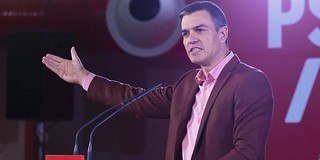The 4 tasks that the president of Poland has set for NATO to stop a Russian attack
The previous Polish Prime Minister, Mateusz Morawiecki, alerted the European Union about the Russian threat in 2021, and the EU did not pay attention to him.
After the last legislative elections in Poland, that country has changed its prime minister, putting Donald Tusk in his place, whose allies in Brussels were the ones who ignored the Polish government's warnings about Putin. However, Andrzej Duda, a member of the same Prawo i Sprawiedliwość (PiS, Law and Justice) party to which Morawiecki belongs, remains the president of the Republic of Poland, and He seems determined to take over from the former Polish prime minister in the task of alerting Europe to the danger of Vladimir Putin's Russian imperialism.
Yesterday a meeting of the Three Seas Initiative was held in Davos (Switzerland), on the sidelines of the World Economic Forum meeting in that same town. A total of 12 countries from Central and Eastern Europe are part of this initiative, which has its clearest historical precedent in the Międzymorze (Intermarium) project of the first president of the Second Polish Republic, Józef Piłsudski, which sought to coordinate the countries of that region against the threat of Soviet Russia .
At the aforementioned event, Andrzej Duda sent a warning message to NATO in the face of the Russian threat: "NATO has to clearly demonstrate its strength. Today collective defense, provided for in Article 5 of the North Atlantic Treaty, has to stand for reliability, immediate action, strength and unity." The Polish president added: "Potential aggressors, including especially Russia, can have no doubts that an attack on NATO countries has no chance of success. In order to achieve that, we must urgently focus on a few key issues." Duda has listed those issues:
"First of all, it will require the maintenance of a permanent and strong Allied presence, in particular in the Eastern-flank countries.
Secondly, the Alliance should keep updating its defense plans, possess the assigned forces prepared to execute such plans, APS facilities* in strategically important locations as well as the command structure adapted to challenges resulting from large and high-intensity land operations.
Thirdly, we should construct robust logistics and infrastructure, including fuel supply system for the troops on the Eastern flank. Major military bases in Central Europe should be connected by a network of allied pipelines, just like the major military bases in Western Europe.
Fourthly, one should develop and integrate a joint missile defense system. Today Russian missiles pose a threat not only for Ukraine. Poland knows it very well since as a frontline state we have experienced this kind of threat directly."
Duda added: "There is a long list of tasks facing NATO. Every member of the Alliance should also remember to fulfill their duties – ensuring the relevant level of defense spending and developing own national capabilities."
So far, Poland's warnings regarding Russia have been correct. After all, it is a country that has the Russian threat right on its borders (in the Kaliningrad enclave). The question that the rest of Europe should ask itself is whether it is willing to continue running the risk of ignoring these warnings, especially those countries that, as is the case of Spain, continue investing in defense well below the commitments it has acquired with NATO.
---
* NOTE: APS (Army Prepositioned Stock) facilities are military equipment stored in different locations, so that they can be used in the shortest possible time if necessary. The United States has several APS facilities in Europe, specifically in Dülmen and Mannheim (Germany), Eygelshoven (Netherlands), Zutendaal (Belgium) and Livorno (Italy). Another one is being built in Powidz (Poland).
---
Photo: Andrzej Duda.
|
Don't miss the news and content that interest you. Receive the free daily newsletter in your email: Click here to subscribe |
- Most read
- The Pegasus case and how it could end with Pedro Sánchez due to a decision by France
- What did Morocco find in Pedro Sánchez's cell phone to humiliate him in this way?
- The real reason for Sánchez's victimizing letter using his wife as an excuse
- The episode of 'The Simpsons' that explains Pedro Sánchez's victimizing maneuver
- The brutal 'touch and go' of a Lufthansa Boeing 747 at Los Angeles Airport
- Dead and fictitious people in the manifesto of 'journalists' in support of Pedro Sánchez
- A large collection of Volkswagen cars hidden in an abandoned mine in Switzerland

 ES
ES





Opina sobre esta entrada: